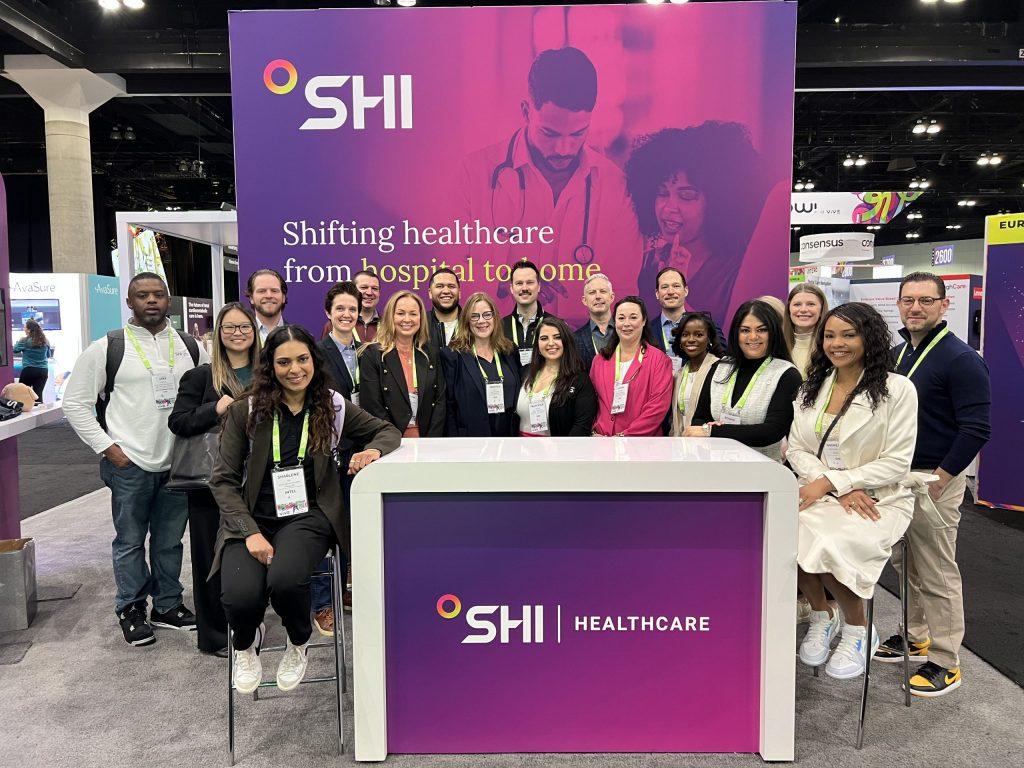Missed ViVE 2024? We have your guide to healthcare’s technological future:
From AI to cybersecurity, ViVE 2024 addresses the future of healthcare.

ViVE 2023’s gathering of more than 5,000 healthcare professionals in Nashville sparked vigorous discussions around artificial intelligence (AI), data analytics, telehealth expansion, and rampant cyber threats. However, lingering questions remain on overcoming adoption barriers and ethical considerations to apply these tools.
ViVE 2024 convened in Los Angeles, with over 8,000 leaders spanning payers, providers, startups, policymakers, and investors searching for answers to those complex questions to map the road ahead.
Attendees float between sessions and speakers, mining each for actionable ideas to lead healthcare’s ongoing transformation.
How can technology remove barriers to care and fill gaps exposed by the pandemic? What cybersecurity strategies must we urgently adopt to combat increasingly cunning attacks? What can we do to ensure equitable and sustainable healthcare for all?
With three days of lively discussions now in the books, SHI attendees reflect on the most monumental trends promised to transform healthcare’s future. Here are some hot-button topics from ViVE 2024 set to accelerate the industry over the next year and beyond.
The growing buzz around AI in healthcare
Like last year, AI emerged as a central focus area at ViVE 2024. Healthcare organizations and C-suite leaders were eager to understand AI’s potential value and how it could help address their unique challenges.
Discussions centered around conversational AI and generative AI applications in healthcare settings, as well as AI strategy established by the Department of Health and Human Services (HHS). Attendees were particularly interested in use cases such as leveraging AI and natural language processing to document patient-clinician interactions in electronic health records. This example demonstrates the growing focus on the patient experience when adopting these tools.
However, many providers are still in the early stages of understanding and adopting AI. Vendors showcased AI capabilities in their solutions, but there was a lack of specific implementation details and proven return on investment (ROI). Attendees grappled with the ethical and practical considerations surrounding AI bias, validation, and governance.
In a focus group conducted by the SHI Healthcare team, we saw firsthand the many frustrations healthcare leaders have with AI. Although some providers have started their AI journeys, many are relying on vendors to lead the way. AI ethical considerations were also raised, as well as concerns about patient consent and unintended consequences that could lead to biases. Focus group attendees were optimistic about the future but agreed that roles must be redefined and a balance between implementing AI solutions and maintaining provider efficiency is needed.
Despite the challenges, AI is already being embedded into many healthcare applications, even if not explicitly marketed as such. In fact, many organizations are already using AI through their existing solutions from major vendors like Microsoft, who have integrated AI capabilities into their offerings.
As healthcare organizations continue to explore AI’s potential, there is a growing need for education and guidance on evaluating, implementing, managing, securing, and governing AI solutions, as well as integrating data.
Cybersecurity concerns intensify
Alongside AI, cybersecurity emerged as an equally pressing topic at this year’s event.
The Health Sector Coordinating Council (HSCC) announced a five-year strategic plan to improve cybersecurity in healthcare. The goal is to take a collaborative approach toward assessing cybersecurity challenges and upgrading the cybersecurity strategies from “critical condition” to “stable condition.” At the same time, the recent cyberattack on Change Healthcare, a UnitedHealth Group subsidiary, heightened concerns around third-party risk and operational resilience.
Many CIOs in attendance grappled with the fallout from this breach, which continues to disrupt claims processing, cash flows, and pharmacy benefits management for numerous providers. The incident underscored the far-reaching impact of supply chain attacks and the importance of comprehensive third-party risk management.
Cybersecurity strategies — like those laid out by the National Institute of Standards and Technology (NIST) — incident response, and business continuity (BC) planning were all top of mind. Providers sought guidance on assessing and mitigating risks posed by their expanding ecosystem of IT vendors and partners. Discussions emphasized the need for robust vendor security assessments, well-rehearsed incident response playbooks, and clear contractual provisions around security responsibilities.
As healthcare organizations embrace more digital technologies and data-sharing platforms, ViVE reinforced the critical importance of cybersecurity as a foundational enabler of trust and resilience in the sector.
Missed opportunities for deeper insights
While data’s critical role in enabling AI and analytics was acknowledged, attendees craved more practical guidance on leveraging data for tangible clinical and operational improvements. Many organizations struggle with fragmented data silos, inconsistent quality, and lack of interoperability, yet case studies on data governance frameworks and best practices were scarce.
The financial and operational outlook for healthcare organizations amidst ongoing digital transformation received less airtime than expected. A CEO roundtable discussion with a Barclay’s analyst highlighted the contrast between continued growth for large tech companies and a challenging fundraising environment for early-stage digital health startups. Attendees sought more strategies for aligning technology investments with financial sustainability, such as developing robust ROI frameworks and forging risk-sharing partnerships with vendors.
Beyond cybersecurity, little attention was paid to business continuity (BC) planning. While cyber incidents remain a critical threat, healthcare organizations must also understand the potential impact of physical infrastructure failures, like power outages or natural disasters, on their technology systems and patient care delivery.
Sustainability initiatives, often siloed from core operations, should be integrated into overall BC strategies. This includes assessing the resilience of data centers, implementing redundant power supplies, and developing contingency plans for critical systems. By proactively addressing these risks, healthcare organizations can minimize disruptions and ensure essential services remain available.
How SHI can help healthcare organizations advance
While this may all feel overwhelming, the good news is you don’t have to take it on alone. SHI’s experts are here to assist.
Cutting through the noise around AI, SHI provides clear, unbiased guidance on selecting and implementing solutions that drive real value. We help you build robust governance frameworks, mitigate bias risks, and measure ROI to ensure responsible, impactful AI deployments.
Worried about evolving cyber risks? SHI’s comprehensive security services can help you stay ahead of the threats. We identify vulnerabilities, implement multi-layered defenses, and develop incident response plans tailored to your organization’s unique risk profile. Our experts can also guide you through the complex world of vendor risk management while assessing your infrastructure’s resilience and developing comprehensive BC plans.
Want to get the most out of your data? SHI will work with you to unlock the full potential of your data assets. Our team helps you break down silos, improve data quality, and establish governance frameworks that drive interoperability. We empower your organization to harness advanced analytics for clinical and operational improvements.
Additionally, with SHI Healthcare, you can leverage our deep knowledge of healthcare workflows and user-centered designs to implement digital health solutions that enhance patient experiences and outcomes. From telehealth platforms to remote monitoring tools, we ensure seamless integration and high adoption across your organization. And if you’re concerned about how to pay for these solutions, we can also help you find and secure funding through our Grants Support Program.
Accelerating healthcare’s tech-powered future
ViVE 2024 made one thing abundantly clear: The healthcare industry’s appetite for innovation has never been stronger. Everywhere you turned, the conference buzzed with excitement around AI’s transformative potential, cybersecurity’s urgency, and the imperative to turn data into actionable insights.
Yet, beneath the enthusiasm, a current of caution ran through the conversations. Healthcare organizations recognize that digital transformation requires a delicate balance of innovation, risk management, and financial stewardship. Success will hinge on forging strategic partnerships, fostering a culture of collaboration, and maintaining an unwavering focus on patient outcomes.
Ready to propel your organization into a new era of tech-enabled care? Visit SHI Healthcare or contact us today to discover how our experts can help you cut through the noise and harness the power of innovation to reshape the future of healthcare.





